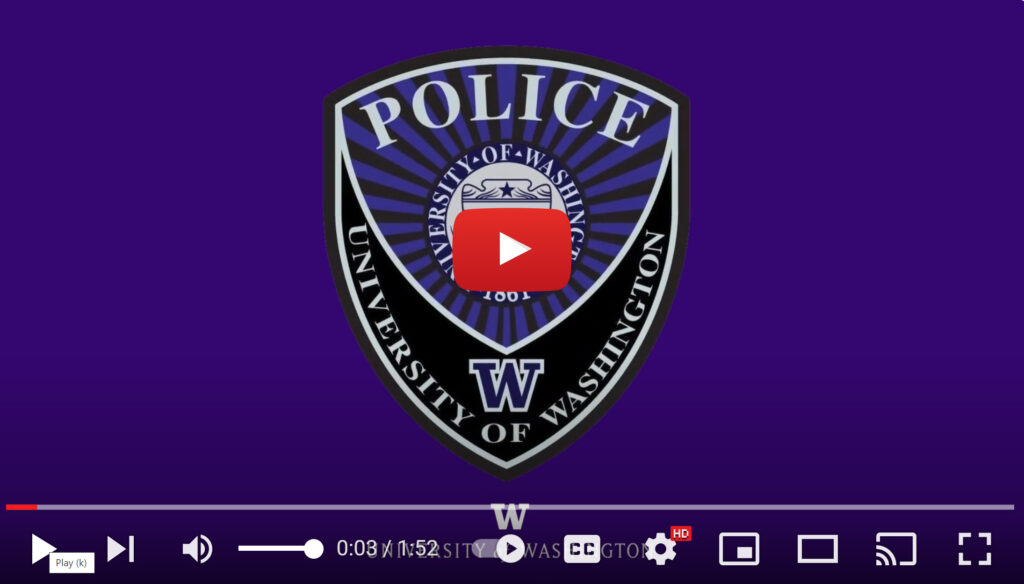Prevent bike theft
March 12, 2024
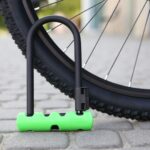
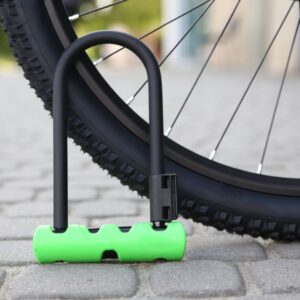 When the weather warms up — we’re pretty sure that will happen someday — more UW students, faculty and staff enjoy commuting and exploring the campus by bike. Unfortunately, that usually means that the number of bike thefts grows, too.
When the weather warms up — we’re pretty sure that will happen someday — more UW students, faculty and staff enjoy commuting and exploring the campus by bike. Unfortunately, that usually means that the number of bike thefts grows, too.Even though we’re still feeling the wind chill, we’ve seen an earlier crop of bike thefts this year. In the first two months of the year, 15 UW community members have reported that their bike was stolen from someplace on campus.
Keeping your bike safe is important to us. Follow these best safety practices to keep your bike safe and ready for a spring ride.
1. Register and Identify
Register your bike. Knowing your serial number makes it easier to return your bike to you if it ever gets lost or stolen and then recovered. Recovery does happen!
If your serial number has worn off or the bike never had a serial number, engrave an owner ID on your bike. Use an engraving tool to apply an owner ID, such as your driver’s license number (never use your social security number). Engraving tools can be borrowed from the UWPD. Call 206-543-0507 to learn more.
2. Lock
In the time it takes for you to attend a class or grab a cup of coffee, a bike thief could be pedaling away. Even if you’re making a brief stop, lock up your bike.
- Use a U-lock. The vast majority of bikes stolen on campus are locked with weaker cable locks. Investing in a good lock is worth it to keep your bike. U-locks are not invincible, but they do require more and sawing through them can attract attention.
- Lock your bike correctly. Secure the lock through at least one wheel and the frame. Locking a quick-release wheel (but not the frame) to a rack puts your bike at greater risk of theft.
- Lock to a stationary object that cannot be cut. UW has more than 7,800 spaces at bike racks across campus. Please don’t lock your bike to a railing or a tree.
- Check into getting access to a bike room, locker or house.
Several UW buildings have secure bicycle rooms for use by building occupants, and most residence halls provide bicycle storage in designated bicycle rooms. Access to bike rooms in non-residential buildings should be coordinated through that building’s Building Coordinator. Access to residence hall bike rooms should be coordinated through Housing and Food Services or with the hall’s front desk.
UW also has 11 shared secure bike houses and more than 600 individual lockers that can be rented on an annual basis.
3. Report
- Call 911. If you see suspicious activity around bike racks, give us a call. This is the most frequent way we catch thieves in the act.
- Make a police report when your bike is stolen. If your bike is stolen on campus, you can report online or call UWPD’s non-emergency number, 206-685-8973. If your bike is stolen in the City of Seattle, for bicycles worth $500 or less, use the Seattle Police Department’s online form. For bicycles worth more than $500, call the Seattle Police Department non-emergency line at 206-625-5011. You can also mark your bike stolen on Bike Index.
- Make an anonymous tip. If you know something about a crime, but wish to remain anonymous, you can call the UWPD on its tipline at 206-685-8477.
Remember to follow UW bicycle rules, and have a safe ride!
UWPD February Blood Drive
February 1, 2024
This Winter, you can show your community that you care by donating blood. It's a simple and easy process that only takes an hour from check-in to post-donation cookie. Donated blood is crucial for cancer treatment, surgeries, and trauma situations. That's why we're urgently looking for new and returning donors to help maintain a safe and reliable blood supply. By donating, you're doing something great for patients and their loved ones, and possibly your loved ones too. Please consider donating blood at the UW Police Department on February 29, 2024
To make an appointment, please visit the Donor Portal or call 1-800-398-7888.
Celebrate safely as you cheer for the Huskies!
January 5, 2024
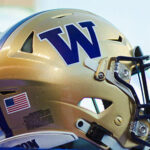
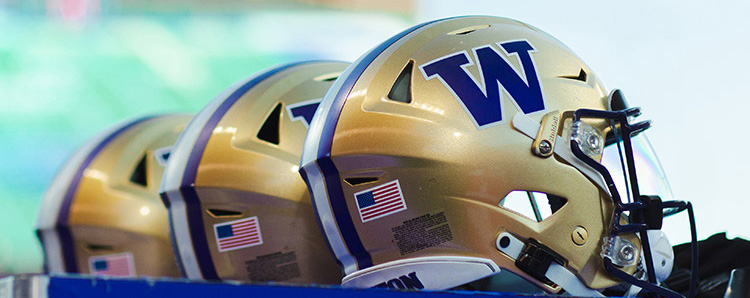
We are counting down the minutes until the Huskies play in the national championship game! As you get ready for Purple Reign, here are a few safety tips for Huskies fans.
Be a Party MVP
Volunteer to be a designated driver. Let your team know that you’ll be there for them when the party’s over with a safe, sober ride home.
Enjoy a winning party
If you’re hosting a party for the College Football Playoffs, have plenty of snacks and nonalcoholic drinks for your guests and the designated drivers.
If you have a drink of any kind at a party, know where it is coming from and what’s in it. Do not leave your beverage unattended. Avoid drinking too much. No one likes a sloppy Husky. Pace yourself — eat, take breaks, alternate with nonalcoholic drinks.
Have a game plan for getting home safely
- Use your Husky Card for a free-to-you ride on a bus or light rail.
- Call a taxi or rideshare service.
- If you’re walking home, leave with a sober buddy (or two), especially if you’ve been drinking. Your blood alcohol level will continue to rise for 20 to 40 minutes after your last drink – science!
Play it safe
If the Huskies win on Monday, celebrate responsibly. Yell-sing “Bow Down to Washington” loud enough that they’ll hear you in Houston, but skip the fireworks and anything else that could get Husky fans hurt (or lead to an embarrassing viral video).
Don’t miss the signal call
If you’re a UW student or employee, sign up for UW Alerts to ensure you get notified if an emergency occurs on our near campus.
More Safety Tips
Additional tips from UW Police to help you stay safe, including protecting your personal safety.
And GO HUSKIES!
Scam calls appearing to come from UWPD
December 8, 2023
We’ve received multiple reports today about scam phone calls that appear on caller ID to come from the University of Washington Police Department.
If you receive a call, do not provide personal information, money, gift cards or anything of value to the caller. UWPD will never call and request funds.
If you have been contacted by someone claiming to be from UW police, please call the UW police non-emergency number at 206-685-8973.
Warning: Watch out for scams targeting UW students
December 7, 2023
You get a call from a law enforcement agency, and the caller says you’re in trouble. If you don’t pay, you’ll be arrested. Sounds scary, and it’s tough not to immediately react. But pausing and verifying the information can keep you from becoming a victim of a scam.
We’ve heard recently from an increasing number of UW students, especially international students, that they’ve been targeted by scammers. These hoaxes are not new but they are constantly being adapted in order to better target the personal and financial information of members of the UW community.
How to avoid a scam
UW’s Office of Information Security encourages you to stay aware and protect your UW NetID login and credentials.
Additional tips from the Federal Trade Commission to avoid a scam.
- Block unwanted calls and text messages. Take steps to block unwanted calls and to filter unwanted text messages.
- Don’t give your personal or financial information in response to a request that you didn’t expect. Honest organizations won’t call, email or text to ask for your personal information, like your Social Security, bank account or credit card numbers.
- If you get an email or text message from a company you do business with and you think it’s real, it’s still best not to click on any links. Instead, contact them using a website you know is trustworthy. Or look up their phone number. Don’t call a number they gave you or the number from your caller ID.
- Resist the pressure to act immediately. Honest businesses will give you time to make a decision. Anyone who pressures you to pay or give them your personal information is a scammer.
- Know how scammers tell you to pay. Never pay someone who insists that you can only pay with cryptocurrency, a wire transfer service like Western Union or MoneyGram, a payment app or a gift card. And never deposit a check and send money back to someone.
- Stop and talk to someone you trust. Before you do anything else, tell someone — a friend, a family member, a neighbor — what happened. Talking about it could help you realize it’s a scam. You can also call the UWPD’s non-emergency line at 206-685-8973.
Recent scams
Scam 1: You’re accused of committing a crime
The caller pretends to be from a police station, border and customs agency or post office. The caller claims they received illegal documents or items under the student’s name, therefore, proving the student had committed illegal acts. The caller then transfers the call from one pretended authority to another, not allowing the student time to think or verify. These calls always involve demanding the student to pay a bail, to provide identification or bank account information or to install Skype for further control of students’ daily life. The caller may also threaten to deport the student from the United States.
The caller(s) also demand the student keep everything confidential, telling the student not to tell their friends, school or parents.
We’ve also heard about calls to students’ cell phones with the caller number showing as 8696110, pretending to be China’s National Anti-Scam Center. The caller informs the student that they have been involved in major criminal cases such as money laundering due to theft of identity information and using forged official documents. Once the caller gains the victim’s trust, the scammer then tricks the victim into transferring money.In these situations, hang up the phone, block the caller and call the University of Washington Police Department’s non-emergency number at 206-685-8973. Do not share any personal information with the caller. Please also report any threats to your safety. The scammers are most likely not calling from the United States and are trying to steal your money, not physically harm you.
Scam 2: Text messages asking for payment or clicking a link
This scam involves fake text messages from delivery companies, post office, bank or a government office asking you to click on a link so you can provide your credit information to pay delivery fees, bank fees or another kind of fee.
In these cases, do NOT click any links. This will avoid software crawling into your phone giving the scammers access to information stored on your phone. We recommend you block the sender.Scam 3: Emails or calls from a fake government agency demanding payment
In this scam, students receive official-looking emails or phone calls that look like an official government agency, such as the Internal Revenue Service (IRS) or Chinese Consulate in San Francisco. These emails or phone calls typically lead to pressure on the student to pay money or threats to deport the student if they don’t pay.
In this case, don't answer the call and block the sender. If you do answer, hang up. Keep in mind, any official agencies, like universities, the police, embassies/consulates, the IRS or immigration agencies, will NOT call you directly to discuss official business or require payments. In the United States, emails and postal mails are the most common forms of official communication.
Scam 4: Emails offering remote jobs with a good salary
In this scam, students receive job offers via email that allow them to work remotely and earn a good salary. One student was offered a job and was then asked to purchase some office supplies or gift cards, being promised to get reimbursed later. It was a scam. In these situations, report the scam to UWPD at 206-685-8973 or UWIT at help@uw.edu.Learn more about job and loan scams from UW’s Office of Information Security.
Wondering if something is a scam? Contact UWPD!
We are here to help. If someone is threatening you and demanding money or making an offer that sounds too good to be true, please contact us at 206-685-8973.
UWPD November Blood Drive
October 24, 2023
Giving blood is a simple way to express gratitude for your own good health and know you’re taking action to help a local patient facing a serious medical condition. Schedule an appointment today to help make sure we all have a healthy year together. Make it a celebration – of hope, community, and the power we all have to save a life. Please consider donating at the UW Police Department in UWPD Hazeley Multi-Purpose Room on November 1, 2023 from 10:00 am to 4:00 pm.
To make an appointment, please visit the Donor Portal or call 1-800-398-7888.
Halloween Safety Tips
October 23, 2023
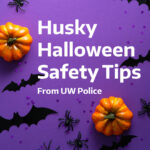

Halloween is coming up soon, and we want you to stay safe while having fun. Here are a few tips and tricks for having an enjoyable night:
- Out late? Use Husky NightWalk or NightRide for a safe trip to places on or near the UW Seattle campus.
- Choose your Halloween costume wisely. Wear something that you can move in and make sure masks and wigs don’t accidentally cover your eyes, impairing your vision. Don’t carry fake weapons or items that could appear to be a weapon. Also, costumes are not an excuse to harass, assault or try to take advantage of someone.
- Stay on well-lit streets and always use the sidewalk. If no sidewalk is available, walk at the farthest edge of the roadway facing traffic. Walk with friends, if possible.
- Don’t assume the right-of-way when crossing a street. Drivers may have trouble seeing you. Just because one car stops doesn’t mean they all will.
- Watch out for your friends and others, whether outside or at a party – be aware of your friends’ whereabouts and try not to leave them unattended. Huskies watch out for each other.
- If you have a drink, know where it is coming from, whether it has alcohol and how much and do not leave your beverage unattended.
- The safest play is to not take any recreational drugs. If you do, be aware of what you have – don’t just trust what a treat giver tells you they’re giving you.
- Avoid playing pranks (particularly on strangers) that can be perceived as threatening.
- Trust your instincts – if something doesn’t feel right, get yourself out of the situation as soon as possible.
- Always carry your phone with you and don’t hesitate to call 911 to report suspicious or criminal activity.
Have a safe and happy Halloween!
Night Walk Advisory - Evening Football games
September 22, 2023
Please be aware that during evening football games, Night Walk service will be unavailable in East Campus and limited in Central Campus one and a half (1.5) hours prior to the start of game until one and a half (1.5) hours after the end of game. UWPD Night Walk staff are unable to traverse in and out of the Stadium area due to traffic restrictions related to the game.
Please rest assured that there will be an enhanced public safety presence throughout the area during this time.
UWPD July Blood Drive
July 13, 2023
On Wednesday, July 19, 2023, UWPD will host a Bloodworks Northwest blood drive in UWPD Hazeley Multi-Purpose Room.
Hours will be from 9:30 am to 3:30 pm (Closed 11:30 am to 12:15 pm), Appointments can be made online at Donor Portal.
Call 911 or UWPD non-emergency number: 206-685-8973 (UWPD)?
June 28, 2023
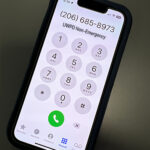
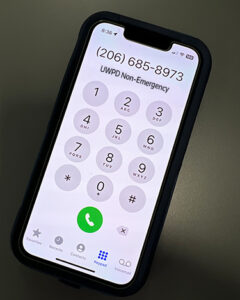
If you have an emergency where there’s immediate danger, you should contact 911.
But what if it’s not an emergency? Examples of non-emergencies include:
- Property crime that happened in the past without suspects nearby, such as discovering your bike was stolen last night.
- Suspicious people or circumstances that do not pose an immediate risk.
- Noise complaint
- Vandalism
- Lost or found property
If you want to report a problem or concern about something at the UW campus in Seattle that is not an emergency, call the UW Police Department’s non-emergency number. Report a non-emergency: 206-685-8973 (UWPD).
Please use the non-emergency number to contact us instead of email. We may need to get specific information from you about the problem or crime, which is why we ask you to call the non-emergency number instead of emailing UWPD.
UWPD dispatchers answer the non-emergency line 24 hours a day, but emergency calls get priority. You can also report non-emergency crimes online.
We suggest you save the UWPD non-emergency number to your phone, 206-685-8973 (UWPD).
